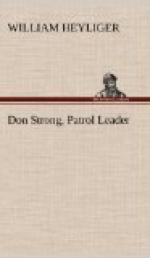“Phew!” said the Eagle patrol scout, “That was a close shave.”
“Close shave nothing,” cried Tim, “He’s wise. Four scouts in uniform, and a patrol leader in baseball clothes and spiked shoes, and riding a bicycle. What does that look like?”
“Well, what does it look like?” Ritter demanded.
“It looks as though somebody jumped on a bicycle and rode after us, you gilly.”
“Gee!” said the scout from the Eagles. “Mr. Wall will want to know—”
“Mr. Wall doesn’t go snooping around,” cried the scout from the Foxes.
“And Don could have told him right here, had he wanted to,” said Ritter.
Tim said nothing. The march home started again. Don, embarrassed, rode far in the van. Twice, looking back over his shoulder, he saw Tim trudging with the others, but with his hands in his pockets and his head bent thoughtfully.
For the second time that day Don was late for a meal. His father, his mother and his sister Beth had gone off to a church social. Barbara gave him his supper; and while he ate, he told her how the scouts had turned back when they learned that Mr. Wall was away.
“They must be all right at heart, Don,” said Barbara.
“Of course they’re all right,” said Don.
Barbara went out to the kitchen for a piece of cake. He sighed, and relaxed in his chair, and waited. It seemed that she was gone a long time. Suddenly he gave a start, and jerked open his eyes, and looked up to find her shaking his shoulder.
“Better eat your cake tomorrow, Don. You’re falling asleep.”
He stumbled upstairs and went to bed. As he lay there, on the borderland of sleep, his thoughts drifted back to Tim walking with the others with his hands in his pockets—the way no scout who was alert and alive should walk.
“Wonder what Tim was thinking about,” he muttered sleepily.
Tim had been thinking about a boy who could have made it hot for him—and who hadn’t. He had expected Don to tell. He had hurried forward ready to argue heatedly in his own defense. And instead, Don had plainly tried to shield him.
He slouched his shoulders with an air of hard toughness, but deep inside he felt small and cheap. He was used to wrangling and boisterous striving for what he wanted. Yet, for all of his roughness, a finer streak of his nature could, on occasion, respond to fair dealing. Squareness—being white—was something he could understand. Don had been white.
He found himself wishing, as he walked along, that he had never started the hike. He had seen Mr. Wall’s eyes travel in his direction as though picking him out as the ringleader in whatever mischief had been afoot. He wondered what the Scoutmaster thought of him.
“Aw!” he told himself uncomfortably, “I’m a mutt.”
For the time being, at least, his hot blood was chastened. He had gone off that afternoon and had left several chores undone. When he reached home his mother scolded and his father threatened. It was no new experience. Nevertheless, he finished the neglected work in silence, and in silence he ate his supper.




